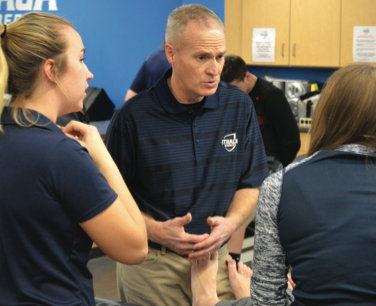Aug 30, 2018AT Degree Change

The clock is ticking for colleges and universities that offer undergraduate athletic training education programs. Under new standards set by the Commission on Accreditation of Athletic Training Education, the last class of undergraduate students who will be able to sit for the NATA Board of Certification exam upon completing their degree will enter in fall 2022. After that, accredited professional athletic training education will only be offered at the graduate level.
In light of the new rules, schools that currently offer undergraduate programs will need to alter their curriculums, which will affect both their academic and athletic departments. Some have already started adjusting.
Nicholls State University is somewhat ahead of the game. This spring, it shut down its bachelor’s degree in athletic training and replaced it with a pre-athletic training concentration that will prepare students for a graduate athletic training program at another school.
This spring, Nicholls State shut down its bachelor’s degree in athletic training and replaced it with a pre-athletic training concentration that will prepare students for a graduate athletic training program at another school.
“[The concentration] is absolutely something different than the athletic training degree,” Gerard White, MEd, LAT, ATC, Assistant Professor and Clinical Coordinator for Athletic Training at Nicholls State, told The Nicholls Worth. The school’s undergraduate curriculum included labs and clinical hours, White explained, whereas the classes in the new concentration are lectures designed to introduce students to certain aspects of athletic training.
As a result, Evan Dauterive, MA, LAT, ATC, Head Athletic Trainer at Nicholls State, will no longer receive the same level of assistance from undergraduate students. “We’ll lose a lot of help we used to get from them,” he says. “Especially during football when we’re dealing with 100 guys at a time, having those students was a big benefit. [Our state law allowed them to] do small rehab treatments or get players warmed up for practice while the staff and I taped them. But the pre-athletic training students won’t be able to do much more than fill coolers and maybe stretch guys out.”
Ithaca College is another school that has been busy making plans. While it has not officially announced its intentions, the school hopes to offer a “hybrid” five-year athletic training program. With this model, students would spend their first three years in an undergrad curriculum that would transition into a master’s degree program during the fourth year, followed by a fifth year (including summer school) of graduate education. Students would earn some sort of pre-athletic training bachelor’s degree (with details still to be determined) and a master’s degree in athletic training.
“Our plan would get them graduated, certified, and on the job market a year earlier than if they went to a two-year, stand-alone master’s program,” says Paul Geisler, EdD, ATC, Professor and Director of Athletic Training Education at Ithaca.
While some colleges are adding two-year graduate programs in athletic training, Nicholls State and Ithaca were reluctant to do so. Roadblocks for some programs to this path may include having enough faculty qualified to teach master’s-level athletic training courses and no longer being able to offer certified athletic trainers free tuition in return for serving graduate assistantships in the athletic training room.
“One of the challenges with the degree change for private schools like Ithaca is the debt that students are going to incur to become certified athletic trainers once they have to get a master’s,” says Geisler. “We determined early on that going to a two-year, stand-alone master’s program was probably not in our best interest because of the additional resources we would need, including faculty, and the difficulty of trying to recruit 15 to 20 students per year. We weren’t sure we could get that many to pay our graduate fees after they already incurred their undergrad debt.”
The evaporation of the graduate athletic trainer position will remove certified athletic trainers serving as graduate assistants from the workforce. This will also affect athletic departments — whether their school has an athletic training curriculum or not.
At Nicholls State, Dauterive has started to plan accordingly. “We’re hoping to add staff positions and looking at creating an internship that can provide real-world experience for newly certified athletic trainers,” he says. “These people will have master’s degrees, so they may not be willing to work for an intern’s stipend, but then again, they might need the experience. It will be interesting to see how we can find a middle ground that will be beneficial to everyone involved.”
Geisler has noticed that some bigger colleges are already converting many of their graduate athletic training positions to full-time staffers. “We’re starting to have more difficulty getting our students into graduate assistantships at these schools,” he says. “A number of schools where we have long sent our graduates have transitioned those positions to staff jobs.”
Despite the current uncertainty, Geisler expects the changes will be good for the profession. “If athletic departments want athletic training coverage, they’re going to have to step up to the plate and hire athletic trainers for staff positions — and to me, that’s a positive,” he says. “For too long, we’ve been allowing athletic departments to pay $10,000 or $15,000 stipends with free tuition to people who were already certified and working 40 or 50 hours a week. A lot of us, myself included, got our master’s degrees that way without taking loans or paying tuition. But as a profession, it has held us back, and I am enthusiastic to see what the future holds.”
This article appeared in the July/August 2018 issue of Training & Conditioning.


